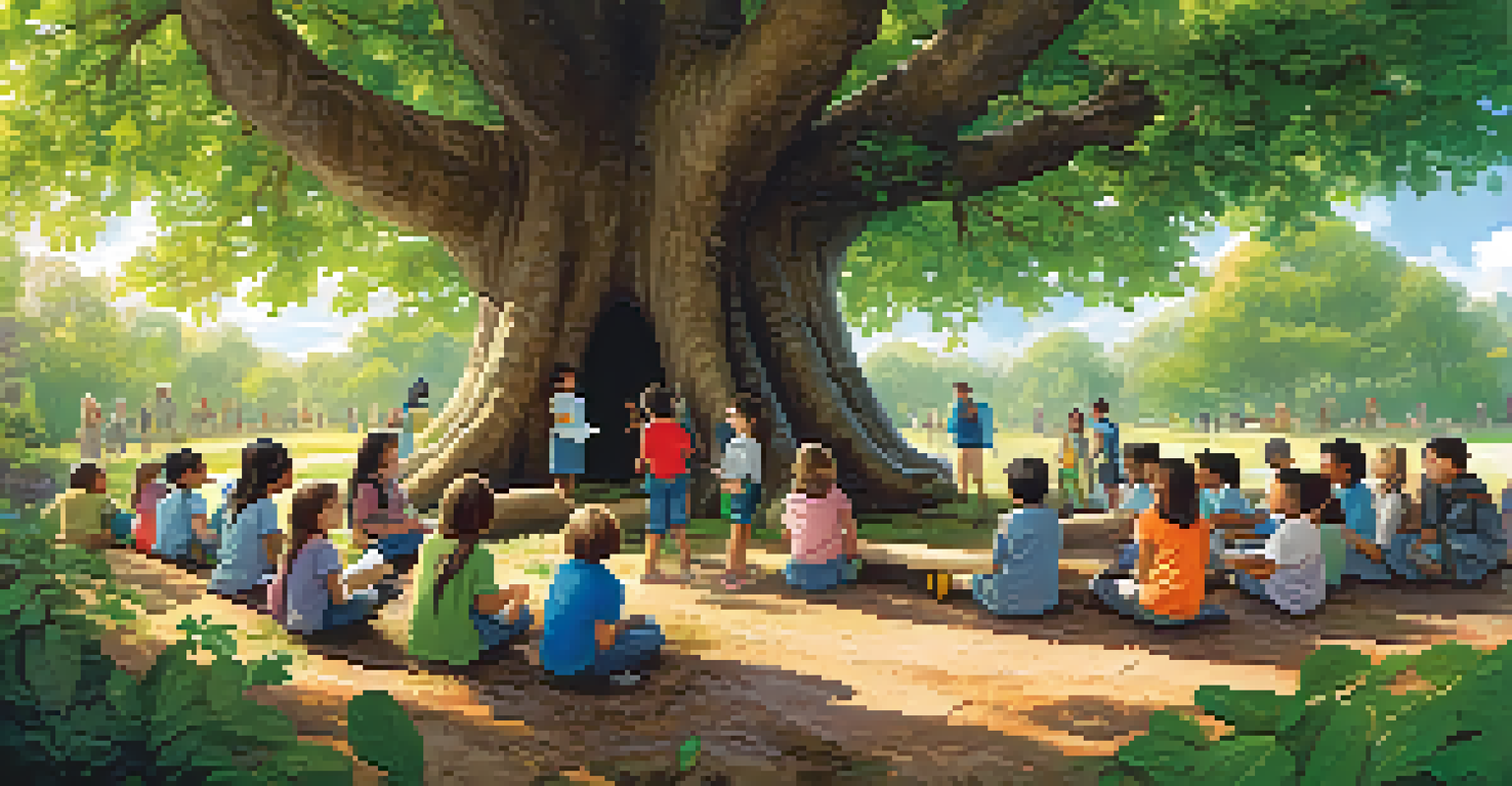The Benefits of Planting Trees for Future Generations

Trees Combat Climate Change and Improve Air Quality
Trees play a crucial role in combating climate change by absorbing carbon dioxide, a major greenhouse gas. They act like natural air filters, taking in CO2 while releasing oxygen, which is essential for all living beings. This process not only helps clean the air we breathe but also contributes to reducing global warming.
The best time to plant a tree was twenty years ago. The second best time is now.
Moreover, trees can help lower temperatures in urban areas, creating cooler environments and mitigating the heat island effect. By providing shade, they reduce the need for air conditioning, ultimately leading to lower energy consumption. This means healthier communities and a more sustainable planet.
As we plant more trees today, we create a cleaner and cooler atmosphere for future generations. This effort ensures that they inherit a planet where air quality is improved, and climate change effects are minimized, allowing them to thrive.
Biodiversity Flourishes in Tree-Dense Environments
Planting trees contributes significantly to biodiversity, providing habitats for countless species. Forested areas are home to a variety of birds, mammals, insects, and plants, creating a rich ecosystem that supports life. The more trees we plant, the more diverse these ecosystems become, enhancing the resilience of our environment.

For instance, a single oak tree can support hundreds of different species, from fungi to birds. This intricate web of life fosters a balanced ecosystem, which is essential for the health of our planet. By nurturing biodiversity through tree planting, we can protect endangered species and promote ecological stability.
Trees Fight Climate Change
Trees absorb carbon dioxide and release oxygen, helping to improve air quality and mitigate global warming.
Future generations will benefit from this rich biodiversity, enjoying vibrant ecosystems that support not just wildlife but also human health and well-being. The interconnected relationship between trees and wildlife is a legacy worth preserving.
Trees Enhance Our Mental Health and Well-Being
Studies have shown that spending time around trees and green spaces can significantly improve mental health. Whether it’s a walk in the park or simply gazing at a tree, these natural elements have a calming effect on our minds. They reduce stress, anxiety, and depression, offering a serene escape from our busy lives.
Trees are the earth's endless effort to speak to the listening heaven.
Additionally, trees provide spaces for recreation and relaxation, promoting a sense of community. Parks filled with trees encourage social interaction, physical activity, and a stronger connection to nature. This sense of belonging and community is crucial for our emotional well-being.
By planting trees now, we are paving the way for future generations to enjoy these mental health benefits. They will have access to nature's therapy, fostering healthier, happier communities.
Trees Provide Essential Resources for Future Needs
Trees are not just beautiful; they are also a source of essential resources. They provide timber for construction, fruit for sustenance, and even materials for medicine. By planting trees, we create a sustainable source of these resources for future generations.
For example, fruit trees can offer food security, reducing reliance on industrial agriculture. As populations grow, having a reliable source of nutrition becomes increasingly critical. Trees can also provide materials for renewable energy, such as wood pellets, contributing to a greener future.
Trees Boost Biodiversity
Planting trees creates habitats for diverse species, enhancing ecosystem resilience and supporting wildlife.
By investing in tree planting today, we ensure that future generations have access to these vital resources. It’s an investment in sustainability that supports both human needs and environmental health.
Trees Improve Soil Health and Prevent Erosion
Trees play an essential role in maintaining soil health and preventing erosion. Their root systems help anchor the soil, reducing the risk of landslides and keeping nutrients in place. This is particularly important in areas prone to heavy rainfall, where unprotected soil can wash away.
Furthermore, trees contribute to the nutrient cycle by shedding leaves and organic matter, enriching the soil. This process fosters a healthy ecosystem that supports agriculture and plant life, ensuring food security for future generations. Healthier soil also means better water retention, which is crucial in times of drought.
By planting trees, we are not only protecting the soil but also promoting sustainable agricultural practices. Future generations will inherit fertile land that can support diverse crops and sustain communities.
Trees Create Spaces for Education and Awareness
Planting trees creates opportunities for education and awareness about the environment. Schools and communities can engage in tree planting activities, fostering a sense of responsibility towards the planet. Such initiatives can teach the importance of conservation and sustainability to young minds.
Moreover, trees can serve as living laboratories for students, allowing them to study ecosystems, biology, and environmental science firsthand. This hands-on experience is invaluable in cultivating a generation that values nature and understands the importance of preserving it.
Trees Enhance Mental Well-Being
Spending time around trees and green spaces can reduce stress and promote a sense of community and belonging.
By prioritizing tree planting, we are investing in educational initiatives that empower future generations to become stewards of the earth. They will carry this knowledge forward, ensuring a sustainable legacy.
Trees Contribute to Economic Growth and Stability
Planting trees can significantly contribute to local and national economies. Forests provide jobs in areas like logging, tourism, and conservation efforts. Additionally, urban trees can increase property values, making neighborhoods more desirable and economically vibrant.
Moreover, green spaces attract tourists, boosting local businesses and creating a thriving economy. Cities with ample trees often report lower healthcare costs due to the improved air quality and mental well-being of their residents. This economic benefit extends beyond immediate financial gain; it fosters community pride and sustainability.

By investing in tree planting today, we lay the foundation for economic stability and growth for future generations. They will inherit not just a healthier environment but also thriving communities.